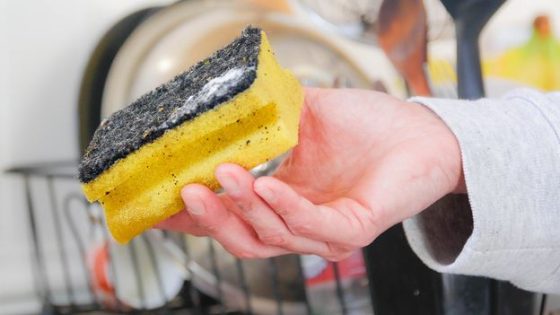Your kitchen sponge teems with bacteria, raising questions about its safety. As of February 19, 2025, research shows that sponges can harbor billions of microbes, making you wonder: is a washing brush a better choice for dish cleaning?
- Kitchen sponges harbor extensive bacterial life.
- Sponges provide ideal conditions for microbes.
- Most bacteria in sponges are non-harmful.
- Pathogenic bacteria can thrive in sponges.
- Washing brushes contain fewer bacteria than sponges.
- Replace kitchen sponges weekly for hygiene.
Why Are Kitchen Sponges So Bacterial-Rich? Discover the Science Behind It
Have you ever thought about what lurks within your kitchen sponge? Research indicates that sponges provide a warm, moist environment ideal for bacteria to thrive. With food particles trapped inside, these sponges become a microbial paradise. But should we be concerned about the bacteria we’re washing our dishes with?
Comparing Kitchen Sponges and Brushes: Which is Safer?
When it comes to cleaning dishes, the choice between sponges and brushes can impact your kitchen hygiene. Brushes tend to dry out more effectively, reducing bacterial growth. Here are some key points to consider:
- Sponges can hold moisture, making them ideal for bacteria.
- Brushes typically contain fewer bacteria overall.
- Sponges can transfer bacteria to dishes, especially after washing raw meat.
- Regularly replacing sponges can minimize health risks.
How to Maintain Hygiene with Kitchen Sponges
To keep your kitchen sponge as clean as possible, consider these tips:
- Replace sponges weekly for optimal hygiene.
- Microwave sponges for one minute to kill most bacteria.
- Wash sponges in the dishwasher regularly.
- Store sponges in a dry area to prevent moisture buildup.
Understanding Bacterial Risks in Your Kitchen
While most bacteria found in sponges are not harmful, some can be pathogenic. The presence of bacteria like Salmonella can pose risks, especially if they come into contact with food. It’s essential to be aware of how to handle sponges after washing raw foods to prevent cross-contamination.
In conclusion, while kitchen sponges are convenient, they can harbor harmful bacteria. Switching to a washing brush may be a safer option for maintaining kitchen hygiene. Regular cleaning and replacement of sponges can also help keep your kitchen safe.

































